anyway.
lumpley games
Dogs in the Vineyard
kill puppies for satan
Mechaton
Roleplaying Theory, Hardcore
...and more!
local
RSS Feed
Read & Post Comments
A Penny for Your Thoughts
Older Rants and Essays
antiquated anyway
solace
Alas, a blog
the Boondocks
Bruno
Girlamatic
Jenn Manley Lee
Long story; short pier.
Meguey's Dollz
MetaFilter
MonkeyFilter
the Moral Character of the Monkey
My LiveJournal Friends
Penny Arcade
Questionable Content
Real Live Preacher
Relentless Toil
Scary Go Round
scottmccloud.com
Sinfest
Still the original Matt Wilson
Wapsi Square
You Damn Kid
endeavor
the 20' By 20' Room
All But Malice
Attacks of Opportunity
Epidemonology wiki
Esoteric Murmurs
Flaming Monkey
the Forge forums
Heads or Tales
Imagined Spaces
Jeff's Gameblog
John H. Kim's RPG Page
Jonas dagar
the Known World (Blogs)
lateral tangents
the Mighty Atom
Out Of the Box
Perverse Access Memory
Primeval Press
Rainfall
Random Encounters
the Raven's Mutterings
Raven Swallows the Sun
RPGnet Forums
Shining Dodecahedron
This Is My Blog
Unrealities of Mine
Yudhishthira's Dice
publishing
Adept Press
Anvilwerks
Bob Goat Press
the Burning Wheel
Dog-eared Designs
Chimera Creative
Half Meme Press
Incarnadine Press
Muse of Fire Studio
Ramshead Publishing
Random Order Creations
These Are Our Games
timfire publishing
the Forge Bookshelf
the Forge Resource Library
treats
Bolt City
the Book of Ratings
BookFilter
Buzzle.com: Carol
Lay
Buzzle.com: Keith
Knight
Cockeyed.com
Cooking for Losers
Electric Sheep Comix
Enantiodromia
explodingdog
Fantasy Quest
frankandfrank
GamerChickPlanet
Get Religion
the Gilded Blog
Hitherby Dragons
JoT's website
Killing the Buddha
the Law of the Playground
Lore Brand Comics
Meta-Swap fora
Monkey and the Razor
Pan
the Raving Atheist
Richard Packham's website
Sincity
Slayage
Things my
girlfriend and I have argued about
Thor the Barbarian
Tony Dowler's blog
Trollbabe Comics
Uncle Bear
Whedonesque
William Shunn
a useful pot
All Comments
Apple - Movie Trailers
BrikWars!
Catholic Online Spiritual Warfare Education and
Information Center
City of Roses
ClassicReader.com
Conceptual Guerilla's Strategy
and Tactics
Coyote's Den
Crank Dot Net
CSS Reference
Drew Baker
the Editing Room
Emily Care Boss
the Engines of Our
Ingenuity
exegesis &
eisegesis
the Exmormon Yahoo group
Frequently Asked Questions about
Calendars
Griffon Games
HTML
Character Reference
Inform
the Internet Sacred Text Archive
Jennifer L.
Cornish
Joshua Newman
the Journal Comic Jam
Misc/Pennies
Modern Myths Comic Books and Games
NaNoWriMo
Paul Czege
Phoenix Games
the Questing Beast
Sizzling HTML Jalfrezi
the Skeptic's Dictionary
the Self-Made Critic
Septemberquestion.org
Shadows
SlinkP Home Page
the Space-Crime Continuum
the Valley Advocate Film Listings
the Webcomics Examiner
the World, the Flesh, and the
Devil

Current Events
The Fun Has Moved!
Join me at the new fun: www.lumpley.com
1. Whoa. The PHP is like totally borken. Huh. Anyhow no sense clicking the comment threads yet.
2. Also this is the only page that exists yet. No lumpley games pages a'tall.
3. The PHP on this server isn't recognizing "?entry=233" or whatever in the url. It's leaving $entry unassigned. Why?
4. Also, even when I hard code an $entry value, it's not reading the allany file. Strange.
5. The comment threads are FIXX0rD! Big thanks to Jason P. and $_GET.
6. I've set up the new database tables. Next up: interacting with them.
7. TOMORROW the new stuff goes live!
8. ...Well, not quite. Almost. Check www.lumpley.com to see the progress.
Check out my games! Click the "lumpley games" links on the right!
2-3-05
The Ongoing Roleplaying Theory Open House
3-28-05
The Open House, part 2: Roleplaying with someone...
4-19-05
The Open House, part 3: A Wishlist
4-27-05
The Open House 4: Handshaking
Hi, I'm Vincent. Welcome! A lot of us here know one another already, but not everyone. Please introduce yourself. Please especially introduce yourself if you're a regular-ish reader but not so much a commenter - I learn the names and takes of the commenters by their comments, but I'm afraid I haven't really met you yet. I'd like to!
6-7-05
Periodic Refresher
I've gotten really sloppy around here with my use of "rules" and my disuse of "system." Here's a quick review. First system, then rules.
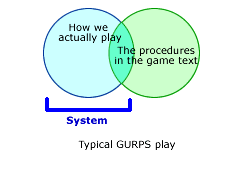
In typical GURPS play, there are a bunch of things you actually do that can't be found in the rulebook, and a bunch of things in the rulebook that you never actually do. System is defined as the things you actually do.
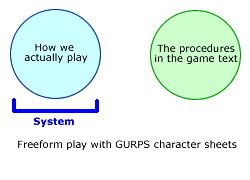
In freeform play, nothing you do can be found in the rulebook, if there even is one. System is defined as the things you actually do.
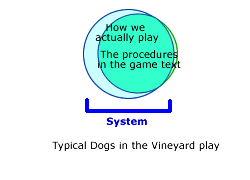
In typical Dogs play, you do practically everything that the rulebook tells you to do, but probably a few things it doesn't. For instance, it gives you no guidance a'tall on how to start and end scenes, but somehow you do start and end scenes. System is defined as the things you actually do.
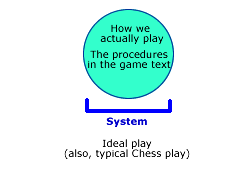
In typical game play, you play by the rules, the whole rules, and nothing but the rules. Is this also the ideal for RPG play? As a designer, I'm torn - maybe this is ideal, maybe the "close enough" of Dogs play is ideal. Either way, typical GURPS play isn't even close.
Here's a little animation showing my own personal experience of Primetime Adventures.
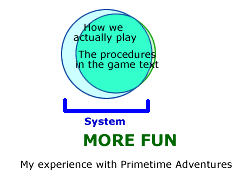
But as you can see, whenever I say system, I mean the things you're actually doing. "System is defined as the process by which you decide what happens in the game." Whatever that process is, that's your system.
But I haven't been saying "system" much these days, have I? I've been saying "rules" a whole lot. I say that the rules in action create a social dynamic. I say that not only needn't rules disrupt immersion, rules can enhance immersion. What do I mean?
Well, consider that the picture of play in my head is the "typical Dogs in the Vineyard" picture, the "more fun" side of the Primetime Adventures picture. What I really mean by "rules" is "the established procedures by which you play." Let's zoom in:
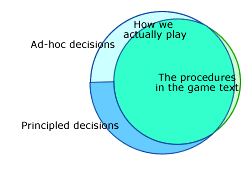
So when we're not using the procedures in the book, we're either making our decisions about what happens on an ad-hoc, once-at-a-time, trial-and-error basis, or on some more established, reliable, principled basis. For instance, in Dogs, you might start scenes differently every time; that'd be ad-hoc. But you might start scenes habitually by the GM saying, "okay, where do you go next?" or "okay, what are you doing?" That'd be principled.
When I say rules, I mean the procedures in the book that you're using, plus the principles you're basing your non-book decisions on.
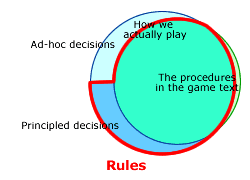
The established procedures by which you play.
This is half of the information you need in order to understand what I'm saying. The other half lives here: How RPG Rules Work.
6-6-05
Oh man, I just totally figured out how to talk about this.
Subtle rules, right? Subtle design goals?
[1] The affirmed rightness of your visionCharles proposes a fourth:
This is social. Your fellow players share ownership of your character, remember; you want and need for them to affirm that your vision of your character is right. They trust you with your character. They won't step in and contradict, override, undercut.
[2] Permission to act with passion
Furthermore, whatever you have your character do, they won't react defensively. If your character threatens something they value, they'll deal with the threat passionately in response, but without ever carrying the struggle up into the social level.
You aren't constrained by the fear that having your character act might step on someone else's toes.
[3] Faith in the robustness of the game's fiction
And you have to trust that the game has room for your character in it. You can't be worrying whether this decision that your character's making might break the game. You have to know, securely enough that it's unconscious, that even if your character transforms the game entirely, the game'll survive.
I would add an additonal underpinning, which is [4] the degree to which the mechanic requires a state of mind which is similar to the PC state of mind. If my PC is trying to be totally open and honest with another character, and the mechanics for doing so pit us as players against each other in a competitive bidding war where one of us will lose and one of us will win, then that would seem to create a conflict between what I am experiencing as player, and what I am experiencing IC, and that may act to the detriment either of my ability to effectively use the rules, or to effectively remain immersed in my character, or both. If the mechanics instead involved us as players working together against abstract difficulty, then that might better mirror the IC situation, and better allow us to remain immersed.I think that a game design that fulfilled these design goals would create extremely intense, profound play. Furthermore, I think that as a design challenge it's an excellent one: difficult but not impossible, at the frontier of theory, compelling and immediate, practically guaranteed to make a successful game.
Anybody have any thoughts about what the design might look like?
6-6-05
Some weekend happenings:
1) I talked to both Ben and Ninja J about "Gamism: why?" They gave me the same answer: "asking 'why would I play a gamist RPG when I can just play a game instead?' is the same as asking 'why would I play Chess when I can just play Bridge instead?'" Gamist RPGs are games, and when you want to play a game you choose one of the games available to you. Makes sense to me.
2) We played the best session of Epidemonology yet! Learned our lesson, we.
3) Very unusual sermon Minister Jon gave at All Souls, unusual and good. Jon's an American Transcendentalist social justice-oriented guy, probably sincerely nice and optimistic but it's hard to judge, isn't it? I don't trust him because I don't see his passions. But this time he sermonized about Cardinal Ratzinger / Pope Benedict, and dang. He used phrases like "theologically toxic" and "spiritually bankrupt" and "thought control." He talked about Catholocism's presumptive place in world affairs and its massive failure to care for its poor and disenfranchised. Its stifling of its progressives and theological innovators (very much Ratzinger's). Its role in the ongoing and upcoming fight to revoke marriage rights here in MA. He waved his arms so hard he punched his microphone out!
4) I finished Under the Banner of Heaven by Jon Krakauer. Great book, very even-handed. It charts Mormonism's history of murder. It frames the historical account inside an account of a divinely commanded mother-and-child double murder in the mid-80's. Ron and Dan Lafferty were the murderers. I calculated the dates and it turns out that when I was 7 or 8 Dan Lafferty had kids around my age and lived within 8 miles of my family, outside of Payson, UT.
5) RPG theory is fun but I'd like to write about religion more here. What, though? Somebody say something to shake me up.
6) We played Modern Art, which I haven't played in several years. What a terrific game. We also played some Carcassonne of the stone age variety. Carcassonne is a better game for fewer people than it is for more; I think 3 players is my fave, but 2 is excellent too. 5 is frustrating. Have I ever played it with 4? Maybe I haven't.
7) I talked to Ben about Social Agenda. The conversation went along the lines of "just as your rules make your play fulfill or fail to fulfill your creative agenda, your social contract makes your play fulfill or fail to fulfill your social agenda." Is that about right, Ben?
Anyway I expect that he'll write a lot more about the subject, so yay!
6-3-05
The Subtle Rules
This is magic. This is the body and the subtle body. Rules have a soul!
Who here has played Pit? It's a great game. Far greater than reading its rules would reveal. I remember quite distinctly sitting there in the midst of and between hands of Pit, going "why, why, why is this game so much fun? Why when every hand ends do we whoop and laugh and shuffle and deal again? What is it, what is it, that grips us like this?"
The rules are so simple they're dumb. Hand of nine cards, you win if you have all the same card, you trade cards blind, no turn taking. So say I have four coffees, two wheats, two oats and a sugar. I hold out my two wheats face down, I shout "two! two! two!" Somebody else is also holding out two cards face down shouting "two! two! two!" When we identify each other, we swap cards. Eventually somebody manages to get all nine of the wheats or whatever and they win.
That's all there is to it! It's a compsci101 sorting algorithm. We enact it. Why on EARTH is it so much fun?
You should play this game. If you're a game designer, you should play this game hard and intently.
Here's why it's so much fun: the whole deck in play becomes ordered more or less equally. I start with three coffees. Soon I have four, then six, then seven. I'm throwing other stuff away as fast as I can to get those last two, I know they're out there circulating, then DING! You've got all nine wheats.
I was >this close<. Every single time, everybody who lost was >this close<. Because the deck becomes ordered more or less equally across everyone's hands.
"Oh man I was this close! Who has those last two coffees, you? Dang! Let's play again!"
The subtle rules. The enlivining principle. When we enact rules, we create a dynamic that's not evident in the rules themselves. It's not enough, as a designer, to create rules that hold together, like corpse parts sewn into person shape. You have to create rules with a soul.
6-2-05
Immersion
You know that thing where you're so into your character that you adopt her emotions, mannerisms, outlook, mood, heart and soul? It's a rush? You aren't thinking about your character, you just do what she'd do without thinking? It gives you deep insights into your character that turn out, on reflection, to be deep insights into yourself, your friends, and the world? It feels totally alien and natural at once? You crave it? That's what I mean by immersion. I assume that's what everybody means by it.
This is more a rant than an essay. Perhaps you will accuse me of geek hate!
1) Way back in the dim history of the endeavor, someone noticed that one of the qualities of immersion is that you don't really think about anything else. Being an emotionally stunted moron, or perhaps just not thinking about it very hard, this person concluded that immersion happens because you don't think about anything else.
Why his friends didn't step in and say "uh no that's stupid" I don't know. Why his fellows didn't laugh him out of the endeavor I also don't know. But now look what we've got!
(Okay, probably it wasn't just one person and his negligent friends and fellows. Probably it was a whole series of small stupidities perpetrated by otherwise smart, reasonable people. Whatever.)
2) Now what we've got is a lame fixation on bogeymen. It's taken as given that a whole raft of entirely positive things will prevent immersion. Things like: game rules where you make decisions as a player, not as your character. Having input into the game's fiction outside of your character's actions and immediate reach. Acting on your shared ownership of your fellow players' characters and allowing them to act on their shared ownership of yours. Thinking about your character's past and future decisions from your own point of view too, not exclusively your character's. Having goals and plans for the game outside of your character's goals and plans. Playing more than one character!
"Will prevent immersion." What nonsense.
I grant that you don't do those things during immersion, at its most intense. But saying that those things prevent immersion is like saying that the commercials prevent your favorite TV show.
3) I dismiss out of hand anyone who says "I once played a game where we admitted our shared ownership of our characters [or pick one], and I didn't immerse at all, therefore..." Okay, you didn't. Drawing conclusions from that is like "I once played Shadowrun, and it sucked, therefore dice pools are anti-fun." Might it, just possibly, have been something else that prevented your immersion? Something maybe coincidental to admitting your shared ownership? Or possibly some combination of admitting your shared ownership plus something else not on the list?
I dismiss, like I say, out of hand. I trust you to think harder than that.
4) Some of you think that I'm saying or about to say something like this: "our intent focus on immersion has blinded us to other, just as fun ways to play." And you're already responding: "maybe so, Vincent, but immersion is my favorite, and those other ways to play may be just as much fun but I don't like them as much." Wrong!
See, that buys into the stupidbad false dichotomy. Let it go. What I'm really saying and about to say is this:
Our shared misunderstanding of what makes immersion happen has parched our experience. WE CAN HAVE IT ALL. Our big monkey brains are fully capable of having immersion and those other kinds of fun all at the same time.
So time to choose. Here are your choices.
Door 1: You immerse. When you immerse, immersion's the only kind of fun you have. When you don't immerse, it's not fun at all.
Door 2: You immerse. When you immerse, you have immersion plus other kinds of fun. When you don't immerse, it's fun anyway.
I don't know about you, but duh.
5) Okay, what's really behind Door number two?
I propose that Immersion happens when three things coincide. Unlike points 1-4, this is not rant, it's an honest proposal. Banish stupid conventional wisdom, reflect on your experiences, evaluate critically, and then yes! Argue, construct, disclaim, make counter-proposals of your own. This is the conversation.
The three things are the affirmed rightness of your vision, permission to act with passion, and faith in the robustness of the game's fiction. ("Time" is not one of the three, although they all take non-zero time to develop.)
The affirmed rightness of your vision
This is social. Your fellow players share ownership of your character, remember; you want and need for them to affirm that your vision of your character is right. They trust you with your character. They won't step in and contradict, override, undercut.
Permission to act with passion
Furthermore, whatever you have your character do, they won't react defensively. If your character threatens something they value, they'll deal with the threat passionately in response, but without ever carrying the struggle up into the social level.
You aren't constrained by the fear that having your character act might step on someone else's toes.
Faith in the robustness of the game's fiction
And you have to trust that the game has room for your character in it. You can't be worrying whether this decision that your character's making might break the game. You have to know, securely enough that it's unconscious, that even if your character transforms the game entirely, the game'll survive.
There. The affirmed rightness of your vision, permission to act with passion, and faith in the robustness of the game's fiction.
6) Personal to J: You and Vicky Vance make enormous sense to me in this light. Far more sense to me than "PTA forces distance between you and your character." What do you think?
Personal to Meg and Emily: in our Ars Magica game, sometimes I'm a particular character, of course. But most of the rest of the time I'm like half-immersed in Acanthus, Severin, and maybe Dezjo or Manuela or whoever else needs to be at hand. I'm thinking as myself, but with my characters right there, jostling and ready to jump up if anything catches their attention. So that's wicked fun. How about you?
Personal to me: in Moose in the City, when Ron passed me that note, my heart just filled with my character. It was the opposite of an undercut; it said that Ron saw my character clearly and was committed to me fulfilling his potential. It was a powerful affirmation.
So sharing ownership can absolutely foster immersion.
7) Immersion and RPG design. Look back now to the list of bogeymen. See how any of them might screw up immersion, by screwing up one of the three thingies, but needn't?
How about a famously non-immersive game: Universalis. Is it because Universalis has such metagamey rules? Because you have to pay attention to things other than your one character? I propose that it is not. I propose that it's because your vision of any given character is always at least a little bit contentious. Your fellow players rarely positively affirm the rightness of your vision, and never formally; the best affirmation you can usually hope for is for nobody to sling coins at you to challenge it. Consequently you don't bond with any of the characters in that immersive way.
So could you design an RPG specifically to foster immersion, but still a solid, well-designed no-myth formalist game? I bet you could. I bet you could and it would work a charm.
5-27-05
Anybody's not following Ben Lehman's This Is My Blog, you really oughta. He's doing rock-solid rpg theory. Here are a couple posts to notice:
Social Agenda, wherein he adds the epynonymous to Creative Agenda and Technical Agenda. I think that'll turn out to be fruitful.
Here's the relationship between creative agenda and technical agenda, right, I think we all get it: none of the technical agendas go along strongly with any of the creative agendas; instead, your particular technical agenda will demand solution to its own set of problems when applied to your particular creative agenda. Whether your play fulfills or leaves unfulfilled your creative agenda depends, in other words, on the details of your technical implementation, not on your technical agenda broadly.
But the relationship between social agendas and creative agendas is going to turn out to be very different, I think. Especially, I think that some some social agendas, we'll find, are very closely tied to some creative agendas. Some social agendas, you'll be able to fulfill by any old play (like "establish my value in this social group"); others, you'll be able to fulfill only by play that also fulfills a certain creative agenda (like "know my own conscience better" and thematic play).
But, well, lots of nailing down and hashing out to be done first.
Also Loving the Minimax, wherein says noncontroversial but good things about how to play a well-designed game.
Good stuff. Read it if you haven't.
5-25-05
Chris Moore:
My core idea is inspired by the French Revolution: how an ideal (justice,freedom) can be corrupted and twisted into something quite unlike what was originally intended.The way to get situation is to make there be a reliable source of conflict. So: What do the characters do, and then, what keeps them from just doing it?
The three ingredients I'm using are Invincible, Accuser,and Companion. I've made them into roles that the PLAYERS take on. They can bring a main character or characters into play within the bounds of these roles, which are originally distributed randomly.
Invincible: "YES!" You get to establish ideas/outcomes/etc. that are "invincible"; they cannot be counteracted by other player statements. These statements become the focus of the game session.
example: "The revolution will succeed!"
Accuser: "YES, BUT..." You get to throw conflicts/barriers/delays/twists at the invincible thing, without directly blocking it.
example: "Okay, the revolution succeeds, but the revolutionaries become as ugly and oppressive as the former aristocracy."
Companion: "YES, AND..." You get to add statements that support either side, without blocking anything previously established.
example: (supporting the Accuser) "Yes, many nobles are beheaded at the guillotine to the roaring applause of the crowd."
So, let's start.
1) The three players agree on a setting, and announce the characters they will play (they can conjure them up later, too). (I need lots more here...situation?)
2) Three scraps of paper, with the three roles written on them, are distributed randomly among the three players.
3) The order goes like this. Roll one six-sided die:
1-2 Invincible, Accuser, Companion
3-4 Companion, Invincible, Accuser
(can the companion ever go first?!)
5-6 Accuser, Companion, Invincible
We roll 2. So the Invincible gets to make one contribution to the scene, then the Accuser gets to, then the Companion gets to support the statements of either one (his/her choice.)
After that, scene ends? roll again, do another scene... I'm getting sketchy at this point.
thanks so much for looking at this...
Is "the revolution will succeed... but the revolutionaries become as ugly and oppressive as the former aristocracy... many nobles are beheaded at the guillotine to the roaring applause of the crowd" the introduction to a scene or its resolution?
5-23-05
I have such a head cold. I think I'm contributing to the eventual snot death of the universe.
5-20-05
You've probably all noticed that the Game Chef competition has started. This is the "musing what I'll do maybe" post. Feel free to comment with your own musings.
I believe I'll take "wine" and "companion," I wonder which for a third. And though his worthless friends guffaw his sudden show of fire | Another round of bourbon and it's easy.
The mechanical limitation is an interesting thing, isn't it?
"There is no character sheet" seems like a good topical choice. But the one I actively dislike is "players' hand gestures have game-mechanical significance," and of course I'm drawn to what I actively dislike.
Anybody else? See anything looks tasty?
5-20-05
Eight and a half hours until the Game Chef ingredients!
Collin:
Things on character sheets, in particular characteristic, skills, and whatnot. What is their purpose, and are we going about the right way of fulfilling their purpose?The latter: no, mostly we aren't going about the right way of fulfilling their purpose. We're held back by our loyalty to the broken old historical approach, it blinds us to what's really going on. We collectively need to do character sheets and what they're for a whole lot better, if we want to accomplish anything.
Accordingly, the former: ready? This is intense.
Imagine Thatcher's London. Imagine a person in Thatcher's London who has everything to lose.
That's a character. That's a whole, playable, complete character. If I ask you to speak in that character's voice, you can; if I present some threat or challenge, you can tell me easily how that character will react; if I describe a morning and ask you what that character will do in it, you'll know. Take ten minutes to think and that character's as real as can be.
Character sheets are useless when it comes to creating, describing, defining, realizing characters. Totally pointless, valueless, toss 'em in the recycling. A notebook is helpful for remembering things, or 3x5 cards or post-it notes, let's use those instead. Or let's use nothing at all, if we can remember what we need to remember! Probably we can.
This isn't (just) to Collin but to everybody: I can't teach you anything useful about RPG design if you persist in thinking that mechanical character creation or the character sheet have anything to do with the character at all. It's a misleading historical mistake to call the process and the paper "character-" anything. If you want to get anywhere, if you want to understand, if you want to create anything at all, you have to let that old error go.
So we start right here at this point: the character exists only in our minds. If we write something down about the character, it's only to remind us, to help us keep the character in our minds. The character cannot be touched by rules or game mechanics at all, under any circumstances, no exceptions. The character is pure inviolate fiction. This is fundamental and inescapable.
And from there we build.
I say, "my character, this guy in Thatcher's london, who has everything to lose, he goes to his lover's flat and convinces him to keep their affair private." You say, "y'know, I don't think that his lover is inclined to keep their affair private, do you?" And I say, "no, I suppose not, but my character is desperate to convince him anyway. In fact, he brings an antique revolver with him in his jacket pocket, in case he can't."
(Look, just look: the character has no "character sheet," but he's a whole character, fully realized. I can play him effortlessly.)
How do we decide what comes true?
We can simply agree. That works great, as long as we really do just simply agree.
We could flip a coin for it. Let's do that: heads my character convinces yours to keep their secret, tails he murders him instead.
Or y'know, that's a lot to deal with. Let's have a rule: whenever a character's life is at stake, that character's player gets to call for one re-flip of the coin.
On the other hand, isn't my character's life at stake too? His wife, his kids, his position, his money, his everything? Which should have more weight between us, your character's life or my character's "life"? Shall we go best two of three, or is that setting life and "life" too equal?
How about this: we'll roll a die. If it comes up 1 or 2, your character will refuse and mine will kill him; if it comes up 3-6, your character will agree to keep the secret and (unknowingly) thereby save his life. It's unequal because my character killing yours is less to your liking than your character ruining mine's life is to mine. It's unequal to be fair to us, the players.
Notice that we haven't considered which is more likely at all. We probably agree that it's more likely, in fact, that your character will refuse, so my character will shoot him. But that doesn't matter - either could happen, so we roll according to what's at stake.
Also, notice that we aren't rolling to see whether your character values his life in the face of my character's gun in any way. We're rolling to see if your character agrees to keep the secret without ever knowing about the gun, or if he refuses without knowing about the gun and my character shoots and kills him.
What we have here is a resolution mechanism with no character sheet. It treats all outcomes as equal, except in cases where it's "a character dies" vs. "a character's life is radically and permanently changed." In those cases, it biases toward the latter.
See?
Let's add a wrinkle. Let's say that over the course of the whole game, each of us is allowed 10 rerolls, no questions asked. Just in case we want another shot at our preferred outcome. Now we need a "character sheet," except that of course it's really a player sheet. We need to keep track of how many of our rerolls we've spent.
Let's add another wrinkle. Let's say that at the beginning of the game, we each choose a sure thing, a limited circumstance where we don't roll, but instead one or the other of us just chooses what happens. I choose "my character's children are in the scene." You choose "once per session, at my whim."
Here, this late, I've finally made a mechanical reference to the fiction of the game. I still haven't considered probabilities at all, and do you see how "my character's children are in the scene" and "once per session" are the same? They're resources for us to use, us the players, to have more control over what becomes true.
Maybe we should write them down on our player sheets too, so that if we forget or get sloppy we can call one another on it.
But so okay, that's pretty good, but how do we come to agreement about the two possible outcomes in the first place? Here's a rule: neither outcome can overreach the present capabilities of the characters involved. That makes sense; if my character didn't bring the revolver, I shouldn't be insisting upon "shoot and kill" as a possible outcome, right? Same with my character's skills and foibles as with his belongings. Like, if I establish that my character has a weak heart, that opens up some possible outcomes for us to propose; if I establish that my character is an excellent driver, that opens and closes some others.
Come to think of it, when do I get to decide if my character has access to an antique revolver, has a weak heart, is an excellent driver? Do I get to decide on the fly or do I have to declare it up front?
Either way, I should write all this stuff down on my player sheet, as I establish it. That way I know what I'm allowed to propose as possible outcomes.
See how this goes? The "character sheet" isn't about the character. Maybe - maybe - it refers to details of the character, if that's what our resolution rules care about. But either way, even if so, the "character sheet" is really a record of the player's resources. "Character creation" similarly isn't how you create a character, but rather how you the player establish your resources to start.
If you like, you can design your game so that the player's resources depend wholly on details of the character.
Or you can just as easily design your game so that the player's resources don't refer to details of the character at all.
Or a mix, that's easiest of all.
Whichever way, you need to establish what resources the player has to begin with, and you'll probably want to write 'em down. That's what's really going on.
Everybody good so far?
5-20-05
Ben Lehman is totally right about Master and Commander. When you rightly recognize that Maturin's the protagonist, everything falls into place, the unlikely coincidence loses its offense, and the movie rocks really quite a lot.
Thanks Ben! I woulda gone the whole rest of my life missing the point of a good flick.
Now I have to find a new example of a movie that screws up its own theme. Fortunately, there are many...
5-16-05
Fractured Family of Men by Real Live Preacher.
Sorcerer Doesn't Scare Me. What's Wrong with Me? by Christopher Kubasik - heavy emphasis on this post of his.
The Vagina Monologues by Matt Wilson - scroll down to May 13, 2005. Read the comments.
I've taken up paintball. It's my very first ever favorite sport. For instance it occured to me this morning that maybe I should exercise sometimes, to improve my game, and that's the first time I've ever had that impulse. I was like, that's weird but good. What with this strong family hx of heart disease, any way I can enjoy physical activity is a good way.
But could I choose a sport with a worse proportion of faux army talk and little boy bullshit to actual play?
5-11-05
A technical note: if you go back into the archives, you'll notice missing comments. I believe that I have most of them - all of them since last fall, probably - here on my hard drive, but I haven't come up with a good way to make them accessible.
My handmade blogging software is really, really stupid, have I mentioned?
I can't really work on it very hard until this summer. Meanwhile, I won't lose your comments, but as they fall backward in time you might lose access to them. If you're proud of something you've posted here and think you might want to refer to it sometime, I encourage you to keep a copy of it yourself.
5-11-05
At his blog Shining Dodecahedron, Jay Loomis is doing what I'm doing, laying groundwork for conversations about RPG theory and design. He doesn't have an open house where we can ask him hard, impossible questions (yet?), but he is saying some provocative things:
Rules also provide context. There is context between the character and the setting, between the player and the system, between the character and color, and more--all in the rules of the game. This is a subtle variation on prescribing how you play the game. The rules give guidance, often implicitly, about how to role-play a character, or how to describe an even in the game.Check it out.
(from What an RPG Needs)
There's more! Click back to antiquated anyway.